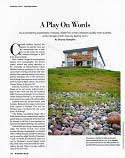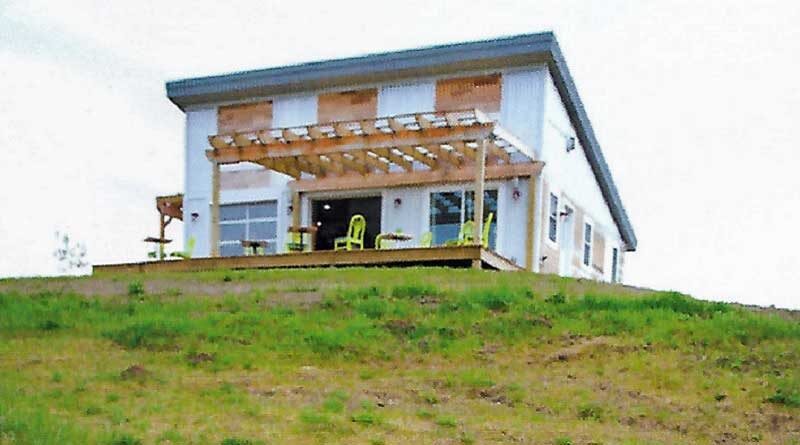A Play On Words

By Dianna Stampfler
As a pioneering sustainable vineyard, WaterFire winery stresses quality over quantity at its intimate Antrim County tasting room
Chantal Lefebvre blended her passion for superior wine and the environment into a fresh start on life when she moved to northern Michigan in 2007 to be closer to family.
With a master’s degree in environmental science and oceanography, the former coastal science and policy specialist at the University of Massachusetts’ Urban Harbors Institute gravitated to the Great Lakes State’s thriving viticulture and wine industry. She worked in tasting rooms before quickly venturing over to the production side of things, learning from award-winning mentors such as Bryan Ulbrich of Left Foot Charley Winery in Traverse City.
Inspired, motivated, and ready to do things on her own terms, Lefebvre took a leap of faith when she and her husband, Mike Newman, purchased a 26-acre defunct cherry orchard a mile off U.S. 31 in Kewadin, just a stone’s throw south of the 45th parallel.
Lefebvre says the off-the-beaten path location, distanced from larger well-known wine regions in Traverse City and the Petoskey area, was discovered over a card game, of all things.
“Our Realtor was playing bridge with a local woman whose husband had a satellite parcel used as a commercial cherry farm that he wanted to sell, but it was important to him that it be kept for farming,” she explains.
Perched 850 feet along a scenic pastoral ridge, the Antrim County tract would become the first Sustainability in Practice (SIP) certified vineyard outside of California, and it would be called WaterFire Vineyards. A play on words, the elemental name is a nod to Michigan’s second largest inland lake, Torch Lake, which is located just a half-mile to the east. Water is to lake, Lefebvre says, as fire is to torch.
After clearing the old cherry trees, Lefebvre — who runs an all-female operation, from the vineyard to the tasting room — installed irrigation, deliberately prepared the soil, and began planting Sauvignon Blanc, Riesling, and Grüner Veltliner (her personal favorite) vines in 2009.
“The climate, elevation, and temperature-moderating effects of the lake are similar to Old Mission and Leelanau peninsulas, where grape-growing land is at a premium. But the soil in our region of Antrim County is a bit different — not as sandy, and more varied with veins and lenses of clay and silt that are sprinkled with glacial rocks,” Lefebvre says.
“Along with our growing practices, these different soils contribute to a signature richness in the mid-palate of our wines,” she adds. “But the truth is, it will take more time and plenty of wine before the terroir of these Antrim hills reveals itself and the potential it holds for great winemaking.”
Taking a step beyond organic, Lefebvre utilizes broader and less prescriptive sustainable practices in all aspects of her no-till farm. Ground cover between and under the rows of vines also does double-duty by protecting the environment.
Low-impact spray products are often organic-based, but Lefebvre also takes advantage of products such as phosphorous acid for fungal control and less expensive sources of micronutrients critical to building secondary metabolites — options not available to organic growers. The SIP program Lefebvre follows supports her personal views on how to live as a steward of the earth.
WaterFire opened its intimate 12-seat tasting room in 2017. With limited space and only four wines (and one Spanish-style cider) currently offered, visitors will find a personal approach to wine sampling where Lefebvre emphasizes quality over quantity.
A guided $12 tasting gives staff the opportunity to go into detail about the winery’s production practices, as well as each individual product. Wines by the glass or bottle, as well as charcuterie plates, are available for purchase for on-site consumption. If all the inside seats are taken and the weather is suitable, the grassy yard makes a comfortable spot for enjoying a picnic overlooking the sprawling vineyards.
“Everything about WaterFire made it worth the stop: friendly and welcoming staff pouring their own estate-grown wine; a stunning, small venue that invites you to linger; and a knowledgeable and approachable owner who shared the backstory of their farming journey and why it matters,” says Wendy Wieland, a local visitor and MSU Extension Program instructor in northern lower Michigan.
Those looking for an extended experience should check out Torch Lake Vineyard Retreat, an AirBnB unit attached to the tasting room, which is available from April to December.
More Flavors
The regional craft beverage trail known as The Torch Lake Tour features nearly a dozen wineries, breweries, meaderies, and distilleries.
PLAN IT!
WaterFire Vineyards
waterfirewine.com
Reprinted from the Summer 2022 issue of Michigan BLUE magazine.

